Related Research Articles

"Fame" is a song written by Michael Gore (music) and Dean Pitchford (lyrics) and released in 1980, that achieved chart success as the theme song to the Fame film and TV series. The song was performed by Irene Cara, who played the role of Coco Hernandez in the original film. It was also her debut single as a recording artist. The song won the Academy Award for Best Original Song in 1980, and the Golden Globe Award the same year. In 2004, it finished at number 51 on AFI's 100 Years...100 Songs survey of top tunes in American cinema.
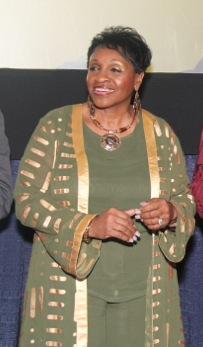
Anita Ward(sources differ) is an American singer and musician from Memphis, Tennessee. Beginning her professional music career in the late 1970s, Ward is best known for her 1979 million-selling chart-topper R&B/Disco hit "Ring My Bell" which was #1 on the United States Hot 100, R&B, Dance and United Kingdom charts.
Carlton George Douglas is a Jamaican-British recording artist based in the UK who is best known for the 1974 disco single "Kung Fu Fighting".
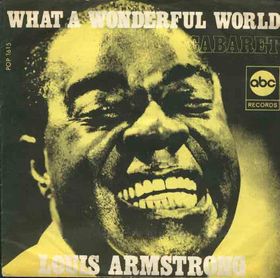
"What a Wonderful World" is a song written by Bob Thiele and George David Weiss. It was first recorded by Louis Armstrong and released in 1967 as a single. In April 1968, it topped the pop chart in the United Kingdom, but performed poorly in the United States because Larry Newton, the president of ABC Records, disliked the song and refused to promote it.

Edison Lighthouse are an English pop band, formed in London in 1969. The band was best known for their 1970 hit single "Love Grows " recorded in late 1969.

"If" is a song written by American singer-songwriter David Gates in 1971. Originally popularized by his group Bread, "If" charted at No. 4 on the U.S. Billboard Hot 100 when released as a single in 1971 and No. 6 in Canada. It also spent three weeks at No. 1 on the U.S. Easy Listening chart, and one week at the top of the Canadian AC chart.

"Three Times a Lady" is a 1978 song by American soul group the Commodores for their album Natural High, written by lead singer Lionel Richie. It was produced by James Anthony Carmichael and the Commodores.

The Tymes are an American soul vocal group who enjoyed equal success in the United Kingdom and in their homeland. They are one of the few acts to have one and only one chart-topper in both the US and UK with different songs.

"Who's Sorry Now?" is a popular song with music written by Ted Snyder and lyrics by Bert Kalmar and Harry Ruby. It was published in 1923, when Isham Jones had a major hit with it. Other popular versions in 1923 were by Marion Harris, Original Memphis Five, Lewis James, and Irving Kaufman.

"The Loco-Motion" is a 1962 pop song written by American songwriters Gerry Goffin and Carole King. "The Loco-Motion" was originally written for R&B singer Dee Dee Sharp, but Sharp turned the song down.

"Na Na Hey Hey Kiss Him Goodbye" is a 1969 song written and recorded by Paul Leka, Gary DeCarlo and Dale Frashuer, attributed to a then-fictitious band Steam. It was released under the Mercury subsidiary label Fontana and became a number one pop single on the Billboard Hot 100 in late 1969, and remained on the charts in early 1970.

"Mull of Kintyre" is a song by the British-American rock band Wings. It was written by Paul McCartney and Denny Laine in tribute to the Kintyre peninsula in Scotland and its headland, the Mull of Kintyre, where McCartney has owned High Park Farm since 1966.

"Do You Want to Dance" is a song written by American singer Bobby Freeman and recorded by him in 1958. It reached number No. 5 on the United States Billboard Top 100 Sides pop chart and No. 2 on the Billboard R&B chart. Cliff Richard and the Shadows' version of the song reached No. 2 in the United Kingdom in 1962, despite being a B-side. The Beach Boys' version reached No. 12 as "Do You Wanna Dance?" in the United States in 1965, and a 1972 cover by Bette Midler reached No. 17.

Marvin Earl Johnson was an American R&B singer, songwriter and pianist. He was influential in the development of the Motown style of music, primarily for the song "Come to Me," which was the first record issued by Tamla Records, the precursor to the famous label.
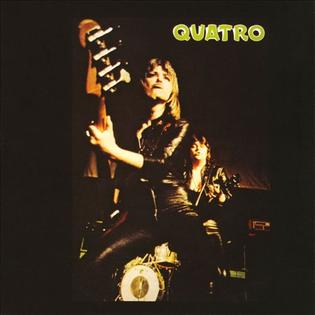
Quatro is Suzi Quatro's second album, released in October 1974 by Rak Records as SRAK 509, with the exceptions of the United States and Canada, Japan and several territories in Europe.

"Take Me in Your Arms (Rock Me a Little While)" is a song written by the premier Motown songwriting/production team of the 1960s Holland–Dozier–Holland. The first hit recording was sung by Kim Weston in 1965. It was most popular in 1975 when it was recorded by the Doobie Brothers.

"Knock, Knock Who's There?" is a song written and composed by John Carter and Geoff Stephens, released on Apple Records. It was originally sung and recorded by the Welsh singer Mary Hopkin and was the United Kingdom's entry at the Eurovision Song Contest 1970, where it came second. The single version was produced by Mickie Most and reached No. 2 on the UK charts.
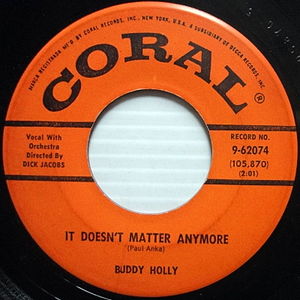
"It Doesn't Matter Anymore" is a pop ballad written by Paul Anka and recorded by Buddy Holly in 1958. The song was issued in January 1959, less than a month before Holly's death. "It Doesn't Matter Anymore" reached number 13 as a posthumous hit on the Billboard Hot 100 chart in early 1959, shortly after Holly was killed in a plane crash on February 3, 1959. The single was a two-sided hit, backed with "Raining in My Heart". "It Doesn't Matter Anymore" was Holly's last US Top 20 hit and featured the orchestral backing of Dick Jacobs. It was also successful in the United Kingdom, where it became the country's first posthumous number 1 hit.
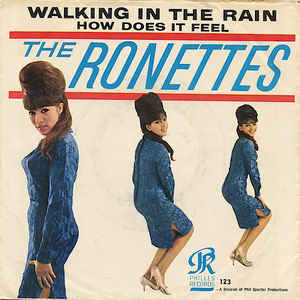
"Walking in the Rain" is a song written by Barry Mann, Phil Spector, and Cynthia Weil. It was originally recorded by the girl group the Ronettes in 1964 who had a charting hit with their version. Jay and the Americans released a charting hit cover of the song in 1969. The song has since been recorded by many other artists over the years, including the Walker Brothers.
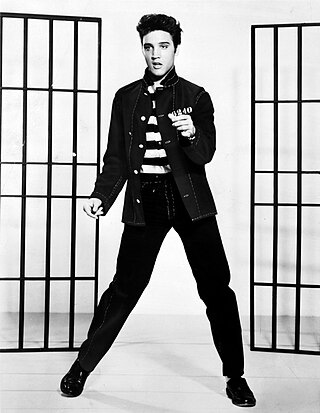
The singles discography of Elvis Presley began in 1954 with the release of his first commercial single, "That's All Right". Following his regional success with Sun Records, Presley was signed to RCA Victor on November 20, 1955. Presley's first single with RCA, "Heartbreak Hotel", was a worldwide hit, reaching the No. 1 position in four countries and the top 10 in many other countries. Other hit singles from the 1950s include "Hound Dog", "Don't Be Cruel", "Love Me Tender", Too Much", "All Shook Up", "(Let Me Be Your) Teddy Bear", "Jailhouse Rock", "Don't", "Hard Headed Woman" and "A Big Hunk o' Love". On March 24, 1958, Presley entered the United States Army at Memphis, Tennessee, and was stationed in Germany. He left active duty on March 5, 1960.
References
- ↑ Jon Kutner; Spencer Leigh (26 May 2010). 1,000 UK Number One Hits. Omnibus Press. pp. 464–. ISBN 978-0-85712-360-2.
- ↑ Kent, David (1993). Australian Chart Book 1970–1992 (illustrated ed.). St Ives, N.S.W.: Australian Chart Book. p. 228. ISBN 0-646-11917-6.
- ↑ "RPM Magazine - November 23, 1974 - Page 7" (PDF).